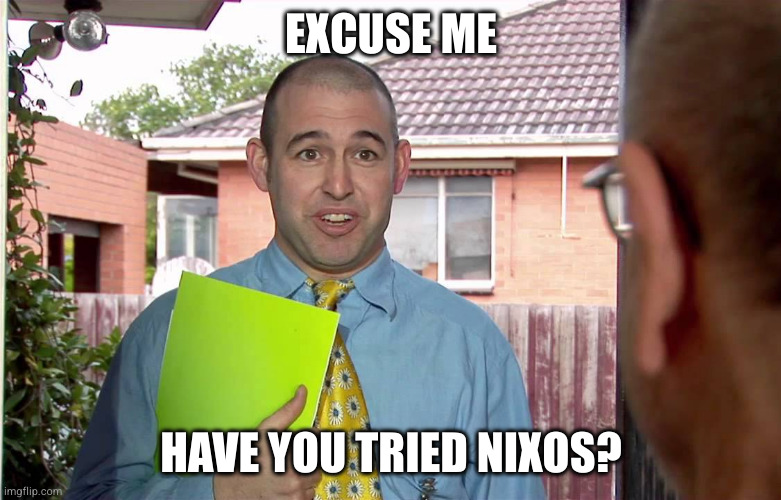The more time I spend with Linux the more I realize that Distro doesn’t matter, GUI doesn’t matter, experience doesn’t matter.
Distro doesn’t matter because you will inevitably come across something that you need that doesn’t work on your distribution.
GUI doesn’t matter because no matter what you do you will %100 have to use the terminal and if you can do it once you can do it again.
Experience doesn’t matter because if you’re inexperienced you have to go outside your Comfort zone, if you’re experienced you got there because you like going outside your comfort zone and you will constantly stay in that state.
WTF are you guys doing with your PCs??? I’ve been running Mint for over a year now and the only time I’ve used the terminal was to open a port for Chromecast. I browse, I game, I watch shows, etc. maybe I’m just really lucky, idk, it’s been nothing but smooth sailing.
We have become philosophers of our own, as tweaking Linux has been a way to meditate our stressful mind to overcome the difficulty of touching grasses.
I personally use it to run a headless docker on fedora 40 server with containers holding jellyfin, filebrowser, pia, qBittorrent a desktop in noVNC a pfsense server, and probably some stuff I forgot.
Why is that not a standard use case?
But in all seriousness I guess I get your point.
Meh, don’t worry about it. If you are happy with how it’s going for you - enjoy the ride! Not everyone needs to be bothered by the terminal. But it IS there if you need it or want to use it.
Besides, if Arch users wanted to be be real gurus they’d be running EMACS and not Arch.
Ffmepg, whisper. Programs that are command-line only and are super useful.
Same could be said for any other distro. I think his point is that when shit just works, nothing makes a difference between distro. Be it Arch, Debian, Ubuntu, Mint, Fedora, Gentoo
Not exactly advanced, but I missed the super+P shortcut when switching from desk and monitor to sofa and TV. Made a couple of one line shell scripts that call Xrandr then bound them to keyboard shortcuts.
😮still Xorg??
I won’t leave a getty for hours sometimes…
The mindset of a true Slacker.
The mindset of a true Slacker.

I guess the username explains the response totally.
Nobody calls me a Slacker!
Well your arch broke, didn’t it?
It’s arch… of course it broke 😂
Arch is the distro that did hold the longest against my torture yet, maybe because everything is from the same repo 🤔😂

Sadly yes.
I’m in the middle of my systems flake rewrite.
Nop
That huge chunk of learning required for arch when you’ve never used Linux before is really hard to imagine when you have years of experience working Linux under your belt. That does not mean it doesn’t exist for new users though.
That shit’s complex and long. Much as I appreciate the sentiment of “the distro doesn’t matter” I really can’t agree.
Arch was my first linux distro and it felt like being dropped in Vietnam. It was hard but it made me learn a ton really fast.
Not recomended to everyone tho.
I realised the same thing.
When I was switching from Windows to Linux on my PCs (both at home and at work), I originally wanted to use Debian because I’m most familiar with it and have been running it on servers for 20+ years.
I have to use Fedora at work though - it’s a lightly-modified version of Fedora that runs some automatic configuration on first boot and first log in for things like ensuring disk encryption is enabled (including adding randomly-generated secondary keys for IT support), 802.1x certificates for Ethernet and VPN auth, Chef, endpoint security, etc.
Anyways, I started using it and love it. I’m running it at home now too. I realised the difference between distros is much narrower than it used to be.
Yes and no for me
Distro doesn’t matter because they only differ in package manager and initial configuration, you can always compile things if you really need it.
GUI doesn’t matter because you’ll end up with all KDE and gnome dependencies installed anyway because your applications need it.
Experience probably matters, but if it doesn’t, it may be because there is just so much there to know.
Distro starts mattering a tad more once you starts experimenting with more esoteric stuff such as Guix, NixOS, QubesOS…
Instructions unclear. I’m running Gnome on Mint.
I wish gentoo was more explored, I felt the same way and then it finally scratched the itch of things working (perhaps even too many options). I actually ended up using gentoo because it was less of a headache to just get things to work in a way that does not feel hacky
I moved to Arch about 20 years ago because I wanted Gentoo but I didn’t want to wait hours for compilation. I remember it fondly though.
emergewas kind of a killer feature.Though I gotta say, I’m a bit more curious now that we have better processors. And I’m curious what I’ve missed over the years.
With binary packages it’s actually doable on a laptop. Also newer laptops have tons of low power cores which are great for something highly parallel like compiling.
I tried out Gentoo for a while, and just using binaries for the web browser and office suite made the compile times a complete non-issue. The problem I had that made me give it up was that when there is software you want that isn’t in the official repos there are a thousand different ways of getting it, and all of them suck. Overlays are supposed to be the solution for that, but man that experience was just awful.
I tried all kinds of things, but in the end all the options basically boiled down to risking breakage, maintaining my own packages, or not using emerge at all, which just feels like it’s defeating the whole purpose of being on Gentoo in the first place.
Right?
Gentoo is the best, every time kids scream about AUR I just chuckle to myself.
Experience doesn’t matter because if you’re inexperienced you have to go outside your Comfort zone, if you’re experienced you got there because you like going outside your comfort zone and you will constantly stay in that state.
I was experimenting a lot during my early Linux months but then I found what works for me and settled with it. I don’t leave my comfort zone much anymore.
NixOS:
a whistle is blown, people start running out the trenches rifle in hand. Shouting while bombs pounder around, you stay still, disoriented. The general grabs your jacket and starts screaming. You cannot figure a single word of what he says, he just puts a monad into your hands.
a monad is a monoid in the category of endofunctors
And I fucking soared
(Btw)
Time for Gentoo
LinuxFromScraaatch
Gentoo: you compile your mother from source, and then give birth to yourself.
I would have kept with the theme of the comic- fifth panel “Die bitch”
You end up saying something similar to yourself after you read and fail to understand a LKML archive because it’s the only available documentation on this specific flag that you may or may not need and if you don’t need it why not turn it off. Repeat this many times for much learning (eventually).
It was a great experience but next time I’m building everything not strictly necessary as a module.
“It was a great learning experience” is how I describe working under the worst bosses in my life. Specifically, to people that I can’t be honest with and say how i truly felt.
One of them was just a straight up malignant asshole. The other was chronically absent. She may have had some good reasons for it, but when I had to stop bailing her out because it was getting to 20-30 hours extra entirely without a schedule… and she started lying (and spoofing texts to prove it was my fault…)
Well, suffice it to say “great learning experience” is the polite way of saying “absolute fucking hell”
The thing about arch, is that if you have a basic understanding of the terminal and computers, the arch wiki can get from that level to a real expert.
So if you ask me, anyone with a basic understanding of the terminal, and a goal to improve, should go with arch.
Can you define a basic understanding of the terminal?
Your basic and my basic could be wildly different.
Know how to use it, understand the basic file system structure, know basic commands (ls, which, cat, mkdir, chmod)
Having completed “Hacknet”, the hit 2015 hacker simulator video game.
(Only half joking)
I played 2 hours of that game. I wondered how close it was to reality. Do those programs that you call in game have real life counterparts?
Mostly yes, but they’re in general oversimplified (for obvious reasons)
But it’s more about offensive cyber security than necessarily the Linux part. The Linux part is just file system navigation and not much more, the rest is the “hacking” part, and that’s what I’m talking about
Disclaimer: I did not complete it, but I got pretty far, and I worked in the cyber security area.
I would however say it’s not a good place if you want to learn as that’s not really the game’s focus. There are better resources out there like overthewire and linuxjourney for that
This was my experience just setting it up as dualboot and not doing super much with it. Sure I failed installing it a few times but I came out with more understanding of file systems, and in the end the wiki told me everything I needed to know.
Oh I feel that, the wiki is a god send. Even for none arch related problems at times.
Arch + manpages + wiki is all you need
Except, if I want that experience again I can just go back to Slackware.
I installed Slackware from 24 floppies I downloaded from a Volkerdings personal server, because I didn’t have a CD ROM. I installed using documentation printed on a dot matrix printer that was versions out of date… It took a day to compile a kernel. I’ve had to manually patch drivers (3c509 baaabyyy).
I dreamed about a future where I never had to do that again. Arch pisses me off.
Ah the old vortex boomerang. That takes me back.
I admit I did sometimes enjoy a good kernel panic with the Aeeeiiiiiiiii scream in the text. When I was expecting it.
Arch is unironically easy.
You only need to know two commands:
archinstall
and
sudo pacman -Syu
PS: If my 60 year old mom can do it, anyone can.
I installed Arch using archinstall and my system finished with missing KDE and important packages. I was also missing secure boot…
Staying on Debian.
How long ago was that? I have installed Arch with archinstall on ~10 different PCs over the last 4 years without any issues. Maybe I just got lucky, though.
A few days ago.
Problably because I’m used to Debian.
Archinstall works until it doesn’t. Recently I tried Luks and BTRFS more than 6 times leading to a script error each and every time. Could I have done something simpler and archinstall work? Possibly. But it offers those things out of the box and for it to fail each and every time ultimately led me back to the wiki to do it manually.
I tried Luks and BTRFS more than 6 times leading to a script error each and every time.
This was actually my experience also, so I went back to a manual install to just get it done. I think the
archinstallscript won’t get any configuration of device-mapper/LVM right (including disk encryption withcryptsetup). The disk encrypt setup had even more hoops to go through than just LVM.
Wasn’t able to have luks and lvm installed with arch-install. Maybe it’s changed now, but also without the script it’s very easy to do.
Some weeks ago I tried to install Arch on an old laptop, and since it have been many years since I’ve installed Arch for the last time, and I’ve heard good things about
archinstall, I decided to try it. Nothing fancy: single drive, LXQt, no encryption, auto partitioning…I tried maybe 4 or 5 times, configuring different settings in the script, and every single time it gave me a broken installation: no GRUB, or no display manager, or incorrect video driver (Intel, no Nvidia here). I supposedly configured all the options correctly, but I never got a working system. In the end I snapped and searched for some video tutorial and installed Arch the old way. I have no desire to use that script again, at least for a long time.
deleted by creator
Not an accurate depiction of birds…after the helpless phase birds become fledglings where they leave the nest but are still dependent on their parents for food. Social structures vary a lot by species but many remain with parents for quite some time.
I mean, some bird species have mothers that essentially drop their fledglings to predators to distract from themselves (and their insecurities), or just simply don’t feel bothered to actually help raise them to maturity.
True. Some just lay their eggs in someone else’s nest and go “good luck!” It’s hard to characterize the behavior universally across an entire class. But I wouldn’t say what’s depicted here is very typical.
It’s also, in my experience, very rare for passeriformes to run Arch Linux.
deleted by creator
The fact that most people assume Arch is a broken mess because of a meme is wild. Same people would think Linux is impossible to use if they used Windows still.
deleted by creator
Gentoo and Slackware are for no mortals
The only people I know who are still running Slackware are doing it via Unraid (which is built on top of Slackware)
deleted by creator
Hey, comparing Debian to a snail and its shell is unfair.
It’s more like a turtle and its shell.
Turtles can actually be surprisingly fast sometimes!
and snappy!
Yes, Debian packages are old. Tell me again when your arch install breaks for the 4th time this week.
and you have a choice with Debian. You can run:
- Stable if you want stability, meaning it doesn’t change often (minor updates only).
- Testing if you want newer packages that have at least gone through some level of testing. They’ve been in unstable for at least 3-10 days with no major bug reports.
- Unstable/sid if you want to assist the Debian project by reporting bugs (which is always appreciated!), or want the “breaks all the time” experience of other distros.
Debian unstable doesn’t break all the time, tho. There’s only been a handful of times in my 27 years of using it that something got truly borked.
(That’s not counting times when two packages have the same file and there’s a conflict. That’s trivial to resolve once you’ve seen it a few times. Even that is relatively rare.)
Arch doesn’t break all the time either, but it’s a meme and therefor 100% true.
An arch user defines “doesn’t break all the time” as “I have to read the news before every update and apply a manual intervention a few times a year, and there’s only been like one time in history that an update made people’s installs unbootable despite them taking those precautions”.
A Debian user defines “doesn’t break all the time” as “I have a cron job running that periodically runs sudo apt update. I have no idea when it does this or what’s changing when it happens and nothing bad has ever happened to me”.
Like, the fact that unattended-upgrades comes pre-installed and enabled by default (for security updates) in Debian GNOME vs the fact that informant exists to force you to read the news in Arch before you update should tell you that the two distros exist in two different universes.
Debian unstable doesn’t break all the time, tho.
Yeah, it was just a response to the Arch memes since I’m sure Arch doesn’t break all the time either.
I’ve never had Debian or Arch completely break, but have had my share of annoying bugs with both of them. Biggest issue I kept having with Debian is it’d just get stuck and wouldn’t update. Think it was 12.4 I had this problem with. Way more annoying than anything Arch did to my system. I’m using Fedora now days.
Same issue as this person: https://forums.debian.net/viewtopic.php?t=156345. That’s not even mentioning the 12.3 debacle which I was thankfully spared of.
The only breakage I used to get was having to update the keyring because I had been away and not spamming pacman -Syyu for gasp several days.
I literally have my OS set to be as bleeding edge as possible since I find it fun. That’s until it breaks, then I hate myself.
Ig doing sysadmin is my hobby.
I mostly use Debian and Fedora, so you’re preaching to the choir
I also use Debian and Fedora on different computers so I’m curious, how do they compare in your opinion? Any interesting differences or reasons to use one instead of the other?
I’m not the person you were replying to, but I was dual booting Debian and Fedora for around a month, and ended up sticking with Fedora.
The main benefit of Fedora is that packages are much newer than Debian (even if you run Debian unstable/sid). Some examples I hit:
KDE Plasma 6.0 was released in February this year, and Fedora got it shortly after release. Debian sid still doesn’t have it - it’s in experimental but isn’t in a fully working state yet. Debian doesn’t focus on completing large upgrades like that until it’s closer to the deadline for the next release.
Until last month, the AMD graphics firmware (and in fact, all non-free firmware) in Debian stable, testing, and unstable was a version from over a year ago (June 2023) that had a bunch of bugs and didn’t support newer GPUs properly at all. See the version numbers here: https://tracker.debian.org/pkg/firmware-nonfree/news/. On laptops like the Framework 16, you hace to manually download firmware from a repo on kernel.org and place the files in the right spot. Fedora comes with the latest firmware in each release.
Fedora also has some niceties, for example it comes with Plymouth (graphical boot-up and shut-down screen) installed out-of-the-box instead of showing a bunch of scrolling text.
The Debian approach is fantastic for servers. Servers have hardware that generally doesn’t change during its lifespan, and need to be stable. A server you set up today still needs to be working the same way 2 or 3 years from now, without worrying about major breaking changes. You can install
unattended-upgradesand get automatic security/bugfix updates with very little risk of anything breaking.On the other hand, for a desktop environment, running the latest versions can have some benefits. Hardware and can change often (especially GPUs and their drivers), desktop environments fix bugs and add new features weekly, etc.
I don’t mind Debian on desktop, but IMO Fedora is better. I’ve been running Debian on servers for over 20 years though, and I’ll continue doing so.
One thing I can’t stand about Fedora is the installer. It might be because I’m more familiar with debian-installer, but I find partitioning in Fedora’s installer much more difficult. I was trying to set up a fairly standard layout on my laptop (EFI partition, /boot partition, LUKS encryption partition with LVM in it, then / and /home ext4 LVs) and I got so frustrated that I set it up in the Debian installer then rebooted into the Fedora installer lol
I’ve had a similar experience. About the old packages with bugs, I think that can work both ways. The newer packages might have bug fixes, but also new features with different bugs. Sometimes it feels like the number of bugs is constant, you just have to choose between old known bugs or new unknown bugs.
I think Fedora requires less configuration because a lot comes working out of the box. I haven’t had any issues yet
I agree. Maybe this is because Debian tries to be everything, the universal OS, server or desktop or whatever, while for example Fedora Workstation can be preconfigured as a workstation. Back in the day around 2008 this is what Ubuntu was to me, a Debian Workstation. Now it’s different, they’ve diverged so much. Maybe Spiral Linux could be a preconfigured Debian Workstation now.



















